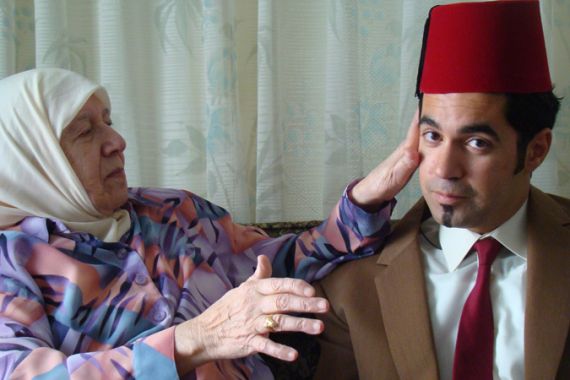
Grandma, A Thousand Times
The story of a feisty and sharp-witted Beirut matriarch as she contemplates the last stage of her life.
Filmmaker: Mahmoud Kaabour
Old age and a sense of life’s ending cannot dampen the spirits of a feisty Beirut matriarch in this magical film about family, love and aging.
Keep reading
list of 4 itemsCannes film festival hopes for ‘no controversies’ as wars, scandals rage
Energy summit seeks to curb cooking habits that kill millions every year
Thousands protest against Israel’s participation in Eurovision final
Fatima or Teta (grandmother) Kaabour is an 83-year-old family matriarch and sharp-witted queen bee of an old Beiruti quarter. She has been gripped as of late by the silence of her once-buzzing household where she raised children and grandchildren. Resigned to argileh smoking and day-long coffee drinking on a now empty balcony, Teta invokes the deepest memories of her violinist husband who died 20 years ago. She claims a preparedness to re-unite with him.
Filmmaker Mahmoud Kaabour, Teta’s favourite grandson and the bearer of his grandfather’s full name, has also been preoccupied for years with the memory of his grandfather. Prior to his death, the violinist had audio taped heart-wrenching violin improvisations in the privacy of his room in that same flat.
The filmmaker’s anguish is compounded at the thought that this personal and cultural heritage, as well as his grandma’s own stories, rare recipes and naughty humour, will go with her when she parts this life.
This award-winning film brings together grandfather, grandmother and grandson in a documentary that aims to defy a past death and a future one. It documents with great intimacy the larger-than-life character of Teta Kaabour, her telling of the trials of her violinist husband and his Beirut, as well as her imaginings of what awaits her beyond death.
| Q&A with the filmmaker |
Does Teta Fatima have any regrets?
Illiteracy is among the few regrets that a tough woman like grandma would admit to, other than grandpa’s death of course.
As she approaches her ninth decade, that dull sense of sorrow over her loss has been interestingly transforming into a yearning, almost like a teen passion getting rekindled. While Teta reminisces about her deceased violinist and re-tells his stories in the film, she sometimes addresses him passionately in the future tense, implying a conviction that she will re-unite with him in death. It is poignant and heart-wrenching at the same time, especially for her adoring family who wish her a long life.
What significant changes has she witnessed in her neighbourhood over the years?
Over the past 40 years, grandma has witnessed the rupture of the extended family unit in Beirut. The Lebanese civil war and globalisation in a broad sense pushed the sons and daughters of all her neighbours to seek better lives in other countries.
My parents were among those who left; that is how my sisters and I were raised in Dubai with a deep sense of longing for Beirut. Grandma’s neighbourhood, which boasted bustling households of multiple generations, has now become a place where the elderly wallow in loneliness.
But with that came unique social bonds. Those aging grandparents watched over each other and bonded from balconies where they resigned themselves to senility and reduced mobility. I am often amused by how grandma can name the families of every apartment visible from her favourite spot on her balcony. After stating the family name, she usually recounts the name of the sons and daughters, their own children and what country they migrated to and when.
How does the family remember the civil war?
The civil war translated into a delightful captivity in her house for us, her grandchildren. We often hid there when schools in Beirut shut down. She cooked for everybody, put little ones to sleep, and meshed every child’s upbringing with her raw humour. That is how her house became a significant place which everyone gravitated to after years of living abroad. My cousins and I are often referring to her place rather than our parents’ when we say “home”.
What are your fondest memories of growing up with Teta?
The street life around her flat and our relation to it still lives with me. Growing up in Hamad neighbourhood in the 1980s, one had to interact with a buzzing pedestrian atmosphere that was tense due to scarce resources. I picked up haggling at a young age as I was entrusted with buying produce from the street vendors. I also remember clouds of flour and loud chatter at bakeries where I had to line up and buy bread for family whenever there was a ceasefire.
The many alleys that connected my parent’s home to grandma’s are my favourite perhaps. When I migrated to Canada for seven years, I tried to walk a different alley to her house in my mind as I tried to sleep each night. By year seven, I could no longer remember the shops that stood at a certain turn. That was part of why I packed up and left Canada.
What is the most vivid memory you have of your grandparents?
The smell of orange peel. Grandma used to sit on her Ajami rugs and sit her grandchildren around her in winter. She used to peel oranges and feed each of us as it poured outside. That’s childhood in a snapshot for me.
Are there any plans to publish your Grandpa Mahmoud’s violin impressions?
“The Music of Mahmoud Kaabour Al-Rasheedi as featured in Grandma, a Thousand Times” was released last year. The seven improvisations that haunted me for years and were the impetus for this film are now available on iTunes, Amazon and in stores in Lebanon and the UAE. It feels like a load off my shoulders and an invitation for new obsessions.
 | Watch more Witness films for global issues brought into focus through courageous and inspiring human stories. |